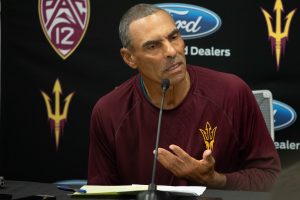- Slug: Sports-Reaction Athlete Law, about 700 words.
- Photos available
By Matthew Roy
Cronkite News
PHOENIX – A controversial law signed by California Gov. Gavin Newsom that could change the landscape of NCAA athletics has drawn mixed reactions from Arizona sports figures.
Newsom signed SB 206, also known as the “Fair Pay to Play Act,” on the set of HBO’s “The Shop” on Friday and news broke this morning when the episode aired. The law allows NCAA athletes in California to profit from endorsement deals and hire licensed agents. It is set to take effect in 2023.
“Every single student in a university can market their name, image and likeness. They can go and get a YouTube channel, and they can monetize that,” Newsom said in an interview with The New York Times. “The only group that can’t are athletes. Why is that?”
Critics worry about the long-range impact of the decision. Arizona State football coach Herm Edwards is concerned it will make it easier for the four Pac-12 California schools – Stanford, California, USC and UCLA – to lure top athletes if other states don’t follow suit.
“It’ll give the California schools an advantage in recruiting, to be quite honest,” Edwards said. “I think you’re opening Pandora’s box when you do that.”
The Pacific-12 Conference issued a statement that it was “disappointed” in the decision:
“This legislation will lead to the professionalization of college sports and many unintended consequences related to this professionalism, imposes a state law that conflicts with national rules, will blur the lines for how California universities recruit student-athletes and compete nationally, and will likely reduce resources and opportunities for student-athletes in Olympic sports and have a negative disparate impact on female student-athletes.”
One of the WNBA’s top players, Diana Taurasi, however, suggested the move is long overdue.
The Phoenix Mercury guard, appearing on “The Shop,” which is co-produced by Los Angeles Lakers standout LeBron James, noted that her jersey was still hanging in the student union of Connecticut, where she played college basketball.
“I graduated in 2004,” she said. “We’re talking about 10 (plus) years later. They’re still making money off of us.”
California senators Nancy Skinner, D-Berkeley, and Steve Bradford, D-Gardena, were the original creators of the bill, which passed through the assembly and the Senate earlier in September, unopposed.
“The NCAA agrees changes are needed to continue to support student-athletes, but improvement needs to happen on a national level through the NCAA’s rules-making process,” The NCAA said in a statement today. “Unfortunately, this new law already is creating confusion for current and future student-athletes, coaches, administrators and campuses, and not just in California.”
After the bill was passed by the Senate and sent to Newsom for approval, the NCAA sent a letter to Newsom which was signed by NCAA President Mark Emmert and 21 other members of the organization’s board of governors. The letter warned Newsom of the ramifications across the college landscape, saying that the bill, which allows college athletes to benefit monetarily off their names, images and likenesses, is “unconstitutional” and “harmful.”
“You’re challenging a system that has been entrenched with money and power and a certain way of thinking for a long time, which I think can resonate with a lot of people in this room, so the minute you challenge that you’re going to get a lot of blowback,” Taurasi said.
The NCAA also warned Newsom that enacting this bill and ratifying it to be a law in the state of California may cause the organization to disallow California colleges from participating in intercollegiate athletics because of the unfair advantage they would have over schools in other states.
However, the bill states that it bars colleges from penalizing athletes from benefiting off of their names, images and likenesses.
“They (members of the NCAA) are a little panicked because they recognize that they are vulnerable,” Newsom said on “The Shop.” “People are hitting this, not just in California but all across the country because the gig’s up. Billions and billions of dollars, 14-plus billion dollars goes to these universities, a billion-plus revenue goes to the NCAA themselves and the actual product, the folks putting their lives on the line are getting nothing.”
This legislation also gives college athletes the ability to hire agents to help them with endorsement deals and contracts.
When told Monday of the California decision, Arizona Cardinals coach Kliff Kingsbury had a simple reaction.
“I’m glad I’m in the NFL,” he said.
For more stories from Cronkite News, visit cronkitenews.azpbs.org.
